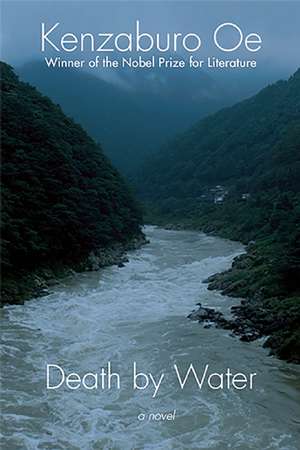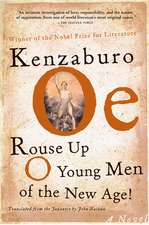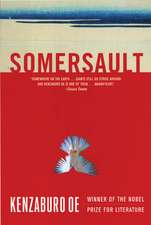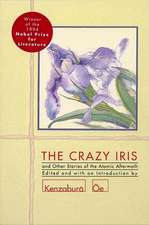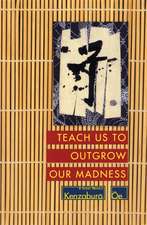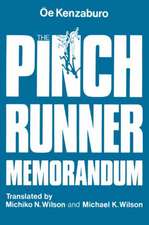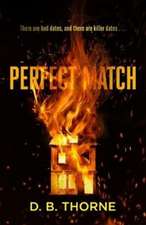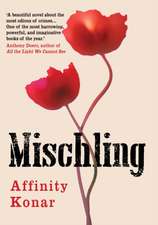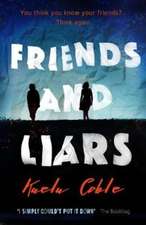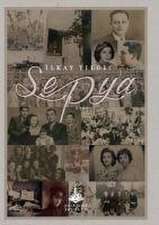Death by Water
Autor Kenzaburo Oeen Limba Engleză Hardback – 5 oct 2015
Kenzaburo Oe was awarded the Nobel Prize in Literature for creating "an imagined world, where life and myth condense to form a disconcerting picture of the human predicament today." In Death by Water, his recurring protagonist and literary alter-ego returns to his hometown village in search of a red suitcase fabled to hold documents revealing the details of his father’s death during WWII: details that will serve as the foundation for his new, and final, novel.
Since his youth, renowned novelist Kogito Choko planned to fictionalize his father’s fatal drowning in order to fully process the loss. Stricken with guilt and regret over his failure to rescue his father, Choko has long been driven to discover why his father was boating on the river in a torrential storm. Though he remembers overhearing his father and a group of soldiers discussing an insurgent scheme to stage a suicide attack on Emperor Mikado, Choko cannot separate his memories from imagination and his family is hesitant to reveal the entire story. When the contents of the trunk turn out to offer little clarity, Choko abandons the novel in creative despair. Floundering as an artist, he’s haunted by fear that he may never write his tour de force. But when he collaborates with an avant-garde theater troupe dramatizing his early novels, Kogito is revitalized by revisiting his formative work and he finds the will to continue investigating his father’s demise.
Diving into the turbulent depths of legacy and mortality, Death by Water is an exquisite examination of resurfacing national and personal trauma, and the ways that storytelling can mend political, social, and familial rifts.
Since his youth, renowned novelist Kogito Choko planned to fictionalize his father’s fatal drowning in order to fully process the loss. Stricken with guilt and regret over his failure to rescue his father, Choko has long been driven to discover why his father was boating on the river in a torrential storm. Though he remembers overhearing his father and a group of soldiers discussing an insurgent scheme to stage a suicide attack on Emperor Mikado, Choko cannot separate his memories from imagination and his family is hesitant to reveal the entire story. When the contents of the trunk turn out to offer little clarity, Choko abandons the novel in creative despair. Floundering as an artist, he’s haunted by fear that he may never write his tour de force. But when he collaborates with an avant-garde theater troupe dramatizing his early novels, Kogito is revitalized by revisiting his formative work and he finds the will to continue investigating his father’s demise.
Diving into the turbulent depths of legacy and mortality, Death by Water is an exquisite examination of resurfacing national and personal trauma, and the ways that storytelling can mend political, social, and familial rifts.
| Toate formatele și edițiile | Preț | Express |
|---|---|---|
| Paperback (2) | 56.96 lei 3-4 săpt. | +25.48 lei 4-10 zile |
| ATLANTIC BOOKS LTD – 7 iul 2016 | 56.96 lei 3-4 săpt. | +25.48 lei 4-10 zile |
| Grove/Atlantic, Inc. – 11 oct 2016 | 95.49 lei 3-5 săpt. |
Preț: 111.76 lei
Nou
Puncte Express: 168
Preț estimativ în valută:
21.39€ • 22.25$ • 17.66£
21.39€ • 22.25$ • 17.66£
Carte indisponibilă temporar
Doresc să fiu notificat când acest titlu va fi disponibil:
Se trimite...
Preluare comenzi: 021 569.72.76
Specificații
ISBN-13: 9780802124012
ISBN-10: 0802124011
Pagini: 432
Dimensiuni: 165 x 229 x 41 mm
Greutate: 0.7 kg
Editura: Grove Atlantic
ISBN-10: 0802124011
Pagini: 432
Dimensiuni: 165 x 229 x 41 mm
Greutate: 0.7 kg
Editura: Grove Atlantic
Recenzii
Praise for Death by Water
One of the San Francisco Chronicle's Best Books of the Year
"[Oe’s] an eloquent spokesman for a generation that can remember, vividly and viscerally, all sides of Japan’s ambiguities—a generation that’s beginning to exit the stage. . . . The combination of this seriousness with a fearsome, graphic candor—trained on himself most of all—makes him formidable, whether he’s describing the challenges of being a parent or the sins of history. . . . A thoughtful reprise of a lifetime of literary endeavor. . . . You have to admire his serene and total conviction." —Janice P. Nimura, New York Times Book Review
"The densest and most rewarding 432 pages you’ll experience this year . . . a wild ride of epic proportions . . . an absorbing, complex collage of multi-layered prose, poetic reference, memories and dreams . . . an essential revelation." —Terry Hong, Christian Science Monitor
"[Oe’s] novels continue to bewilder and amaze . . . Death by Water masterfully captures the vertigo of [an] old writer’s vivid inner world. That he accomplishes this while also looking outward—exploring the state of a nation and the passing of a generation, and what stands to be lost in the process—is nothing short of remarkable." —Gregory Leon Miller, San Francisco Chronicle
"An epic . . . Oe grapples with the idea of duty to family, self, and country but is firmly critical of glamorizing the past." —Elle
"[A] deeply layered portrait of an elderly man blown backward into the future, his eyes planted squarely on the past." —NPR
"It’s taken six years for this big novel by Japanese Nobel laureate Oe to reach Anglophone readers, but that wait has been for something immensely worthwhile . . . it is enchanting." —Booklist (starred review)
"[A] pensive novel, at once autobiographical and philosophical. . . . It's vintage Oe: provocative, doubtful without being cynical, elegant without being precious." —Kirkus Reviews
"Layered and reflexive . . . Told in echoing and overlapping accounts of conversations, telephone calls, and stage performances, Oe’s deceptively tranquil idiom scans the violent history of postwar Japan and its present-day manifestations, in the end finding redemption." —Publishers Weekly
One of the San Francisco Chronicle's Best Books of the Year
"[Oe’s] an eloquent spokesman for a generation that can remember, vividly and viscerally, all sides of Japan’s ambiguities—a generation that’s beginning to exit the stage. . . . The combination of this seriousness with a fearsome, graphic candor—trained on himself most of all—makes him formidable, whether he’s describing the challenges of being a parent or the sins of history. . . . A thoughtful reprise of a lifetime of literary endeavor. . . . You have to admire his serene and total conviction." —Janice P. Nimura, New York Times Book Review
"The densest and most rewarding 432 pages you’ll experience this year . . . a wild ride of epic proportions . . . an absorbing, complex collage of multi-layered prose, poetic reference, memories and dreams . . . an essential revelation." —Terry Hong, Christian Science Monitor
"[Oe’s] novels continue to bewilder and amaze . . . Death by Water masterfully captures the vertigo of [an] old writer’s vivid inner world. That he accomplishes this while also looking outward—exploring the state of a nation and the passing of a generation, and what stands to be lost in the process—is nothing short of remarkable." —Gregory Leon Miller, San Francisco Chronicle
"An epic . . . Oe grapples with the idea of duty to family, self, and country but is firmly critical of glamorizing the past." —Elle
"[A] deeply layered portrait of an elderly man blown backward into the future, his eyes planted squarely on the past." —NPR
"It’s taken six years for this big novel by Japanese Nobel laureate Oe to reach Anglophone readers, but that wait has been for something immensely worthwhile . . . it is enchanting." —Booklist (starred review)
"[A] pensive novel, at once autobiographical and philosophical. . . . It's vintage Oe: provocative, doubtful without being cynical, elegant without being precious." —Kirkus Reviews
"Layered and reflexive . . . Told in echoing and overlapping accounts of conversations, telephone calls, and stage performances, Oe’s deceptively tranquil idiom scans the violent history of postwar Japan and its present-day manifestations, in the end finding redemption." —Publishers Weekly
Notă biografică
Kenzaburo Oe was born in 1935 in the remote mountain village of Ose on Shikoku, the smallest of Japan's four main islands. Oe is considered one of the most dynamic and revolutionary writers to have emerged in Japan since World War II, and is acknowledged as the first truly modern Japanese writer. Oe is known for his powerful accounts of the atomic bombings of Hiroshima and his struggle to come to terms with a mentally handicapped son. His dark musings on moral failure came to symbolize an alienated generation in postwar Japan. Oe's influences and literary heroes are less Japanese than American and European, ranging from Henry Miller to Jean-Paul Sartre, from Blake to Camus.
In 1960, Oe traveled to China where he met Mao Zedong, and the following year he traveled Paris where he met one of his influences, Jean-Paul Sartre. His prolific body of work has won almost every major international honor, including the 1989 Prix Europalia and the 1994 Nobel Prize for Literature. His many translated works include A Personal Matter (1964), Teach Us to Outgrow Our Madness (1969), The Silent Cry (1967), Hiroshima Notes (1965), and Nip the Buds, Shoot the Kids (1958).
In 1960, Oe traveled to China where he met Mao Zedong, and the following year he traveled Paris where he met one of his influences, Jean-Paul Sartre. His prolific body of work has won almost every major international honor, including the 1989 Prix Europalia and the 1994 Nobel Prize for Literature. His many translated works include A Personal Matter (1964), Teach Us to Outgrow Our Madness (1969), The Silent Cry (1967), Hiroshima Notes (1965), and Nip the Buds, Shoot the Kids (1958).
Descriere
Descriere de la o altă ediție sau format:
An astonishing interweaving of myth, fantasy, history and autobiography, Kenzaburo Oe's Death by Water is the shimmering masterpiece of a Nobel Prize-winning author.
An astonishing interweaving of myth, fantasy, history and autobiography, Kenzaburo Oe's Death by Water is the shimmering masterpiece of a Nobel Prize-winning author.
